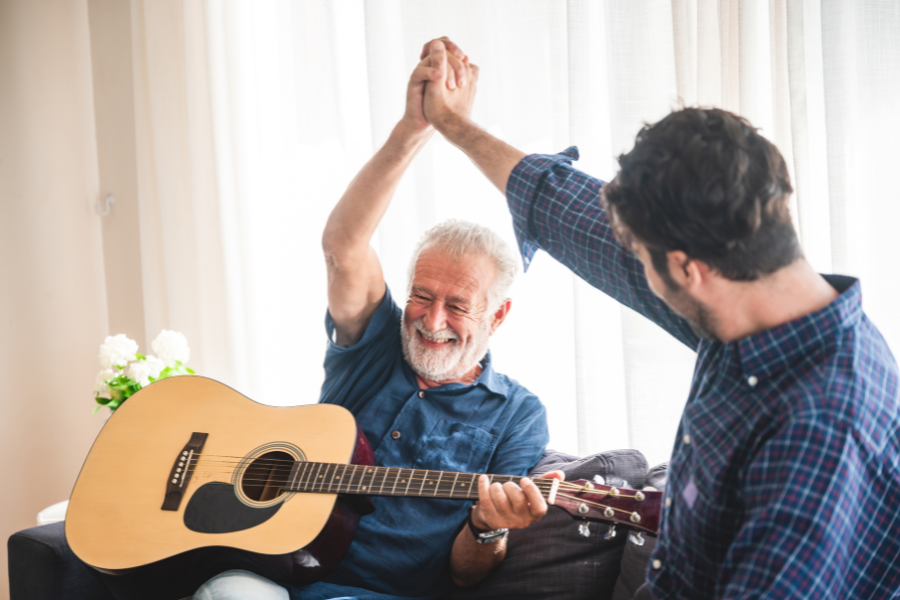How music classes and choirs benefit those with dementia
Music has an unparalleled ability to touch our souls, evoke emotions, and create lasting memories. It is a universal language that transcends cultural barriers and resonates deeply within us.
Beyond its entertainment value, music has proven to be a powerful tool in promoting health and well-being. In particular, those living with dementia stand to benefit immensely from engaging with music, whether through attending choirs or music classes.
Unleashing the Melodies of Joy

Dementia, a condition characterized by cognitive decline and memory loss, can be isolating and emotionally distressing. However, music has the extraordinary ability to unlock memories and emotions even in those who may struggle with communication or expression.
Neurological research suggests that music stimulates various regions of the brain associated with memory and emotion, thereby bypassing cognitive impairments caused by dementia. Listening to familiar tunes from their past can evoke vivid memories, spark conversations, and rekindle a sense of self-identity that often gets overshadowed by the progression of the disease.
Enhancing Cognitive Function

Engaging with music has shown promising results in enhancing cognitive function in individuals with dementia. Research has demonstrated that structured musical activities can improve attention, focus, and memory recall.
Whether it’s learning to play an instrument, participating in a choir, or attending music therapy sessions, these activities provide mental stimulation, challenge cognitive abilities, and promote neuroplasticity. Regular involvement in music classes can potentially slow down cognitive decline, preserve mental acuity, and enhance overall cognitive functioning.
Emotional Well-being and Mood Elevation

The emotional impact of music is undeniable. For people with dementia, who may experience heightened anxiety, depression, or agitation, music can serve as a soothing balm. The harmonies, rhythms, and melodies can evoke positive emotions, reduce stress, and create a calming atmosphere.
Singing or playing an instrument releases endorphins, the brain’s “feel-good” chemicals, leading to an uplifted mood and improved emotional well-being. Music can also act as a bridge between caregivers and individuals with dementia, facilitating communication and emotional connection even when verbal expression becomes challenging.
Fostering Social Connectedness

Music has the remarkable ability to bring people together, fostering a sense of community and belonging. Participating in choirs or music classes creates opportunities for people with dementia to engage with others, build relationships, and combat social isolation.
Music transcends language barriers, enabling people to connect on a profound level, irrespective of cognitive decline. Singing in a choir, for instance, encourages collaboration, teamwork, and a shared sense of accomplishment, fostering a supportive and inclusive environment.
How to get involved
One platform that has recognized the profound impact of music on the well-being of individuals with dementia is Goldster. As an online wellness club catering to the over 50s, Goldster offers a range of engaging music classes designed to be enjoyed from the comfort of home.
With sing-along music classes and dedicated choir sessions, Goldster provides a supportive and inclusive environment for everyone to actively participate in music activities. Through their interactive online platform, Goldster fosters a sense of community, encourages social connection, and promotes the therapeutic benefits of music. By embracing the joy of music, Goldster empowers individuals to harness the transformative power of melodies and create memorable experiences that enrich their lives.
Sign up to Goldster to join music classes online
Lisa Lawrenson
Latest posts by Lisa Lawrenson (see all)
- Masterclass: How to grow a thick healthy lawn - March 31, 2024
- Lawn care – dealing with moss and thatch - March 22, 2024
- A beginners guide to Artificial Intelligence and Chat GPT - February 29, 2024
- 10 minute tutorial: How to arrange supermarket lillies into a stunning floral arrangement - January 1, 2024
- 10 health changes women should watch out for after 50 - January 1, 2024





















